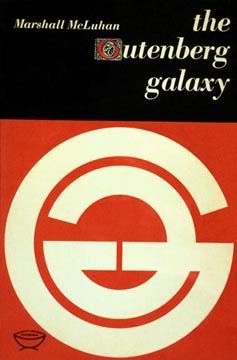In the ever-evolving tapestry of human communication, this Marshall McLuhan‘s book stands as a pivotal exploration of the transformative power of the printing press. The book dissects the profound effects of the printing press on human consciousness and societal structures and also introduces the concept of ‘typographic man’, suggesting that the advent of print technology fundamentally altered the way individuals perceive and process information.
We aim to provide a succinct overview for enthusiasts and scholars alike:

The impact of print: at the heart of McLuhan’s analysis is the idea that the printing press facilitated a shift from an oral and auditory culture to a visual and literate one. With the mass production of books, information became more accessible, leading to the standardization of language and the rise of a more linear and rational thought process. McLuhan contends that the printed word, with its uniformity and fixity, gave rise to a new form of consciousness that he refers to as typographic.
A new worldview: print technology reshaped the cognitive landscape. The book contends that the printing press not only disseminated information, but altered the way individuals perceived space and time. It created a ‘homogenized’ worldview where knowledge was standardized, paving the way for the Enlightenment era.
Linear logic and individualism: this book argues that print technology fostered linear and sequential thinking. The author suggests that the printed page, with its fixed and sequential arrangement of words, led to a mode of thought that was distinct from the multi-sensory and holistic thinking prevalent in oral cultures. This shift contributed to the rise of individualism and the notion of private and personal reading experiences.
Marshall McLuhan paints a vivid portrait of a world transformed by the printing press. As we navigate the digital realms of the 21st century, McLuhan’s exploration of typographic man remains a timeless and enlightening journey into the evolution of human thought and communication. This work serves as a foundational text for those seeking to unravel the intricacies of media’s impact on our minds and societies. McLuhan’s insights provide a lens through which we can understand the impact of current technological shifts on our cognition and social structures. In an era dominated by digital media, the echoes of McLuhan’s typographic man and Gutenberg Galaxy resonate in discussions about the effects of the internet on our collective consciousness.